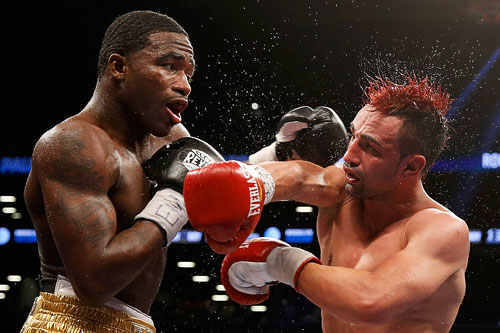A split decision at the end of a boxing match is among the most controversial outcomes in any sport. Unlike an overtime period in basketball or a tennis match that comes down to a tiebreaker in the last set—adaptations that allow a contest to stretch beyond the finish line in order to determine a clear winner—there is no extra time in boxing. When the final bell rings out, a victor must be crowned, no matter how close the bout happened to be up to that point. It certainly doesn’t help that the decision is determined by a panel of judges who, in the absence of a knockout, are left to consider a wide range of dangerously abstract criteria like command of the ring, sharpness of the punches and general aggression when forming their assessments.
Broner makes his move

A split decision at the end of a boxing match is among the most controversial outcomes in any sport. Unlike an overtime period in basketball or a tennis match that comes down to a tiebreaker in the last set—adaptations that allow a contest to stretch beyond the finish line in order to determine a clear winner—there is no extra time in boxing. When the final bell rings out, a victor must be crowned, no matter how close the bout happened to be up to that point. It certainly doesn’t help that the decision is determined by a panel of judges who, in the absence of a knockout, are left to consider a wide range of dangerously abstract criteria like command of the ring, sharpness of the punches and general aggression when forming their assessments.
It is a system that has been widely criticized throughout the years as questions of bias and corruption inevitably arise whenever an unpopular decision is handed down. And, unfortunately, results like these aren’t especially uncommon—Timothy Bradley’s highly controversial split-decision victory over Manny Pacquiao last June, a decision considered by many to be one of the worst in boxing history, immediately comes to mind. Every now and then, however, an exceptionally close fight can still produce a consensus winner, and Saturday’s highly entertaining welterweight championship bout between rising star Adrien Broner and resurgent titleist Paulie Malignaggi went into the books relatively free of controversy.
At just 23 years old, Broner came into the match looking to make his mark on a third weight class, having already won titles at junior lightweight and lightweight on the way to a 26-0 record. He is viewed by many in the boxing community as the heir apparent to another undefeated champion—the legendary (and legendarily brash) Floyd Mayweather. Like Floyd, Broner’s talent has translated well to heavier weight classes. And, like Floyd, Broner has a predilection for trash talk that sometimes threatens to overshadow his virtuosity in the ring. Broner moved up two weight classes for the opportunity to square off against Malignaggi, the Brooklyn native who was fighting in his own backyard at the Barclays Center, and the bout was expected to be an excellent test for both fighters. It more than lived up to the hype.
The Cincinnati phenom faced a tough task against the slick and speedy Malignaggi, but his confidence was never in doubt. Though he threw about 300 fewer punches than his opponent, Broner spent most of the fight advancing on the older Malignaggi, connecting with an array of well-timed jabs and combinations and wasting no opportunity to taunt the WBA champ. After 12 gritty and grueling rounds, Broner was declared the winner on the split, with scores of 117-111 and 115-113 going in his favor, while one judge scored it 115-113 for Malignaggi. Broner concluded his post-fight interview in a fashion that spectators have come to expect of him, declaring, “I came into town, and I got his belt and his girl.”
It will be interesting to see where Broner goes from here. Though he turned in an impressive performance and was the better fighter according to two out of three judges and the majority of the audience,
Broner’s display was not nearly as dominant as expected against an opponent who is known for his durability, exceptional footwork and finesse, but who is also a comparatively weak puncher. Broner was able to throw sparingly because the punches that landed—a stellar 47 percent overall—were powerful and damaging, and he didn’t have to worry as much about the power coming back at him.
In the end, however, the newly crowned welterweight titleist got what he came for: his 27th win in a challenging transition fight against a seasoned pro. Broner appears to be well on his way to the level of acclaim that he is already convinced he deserves. He’ll need to continue to improve against quality opposition but, for now, his argument is a solid one. After all, a split decision victory counts just as much as any other.





